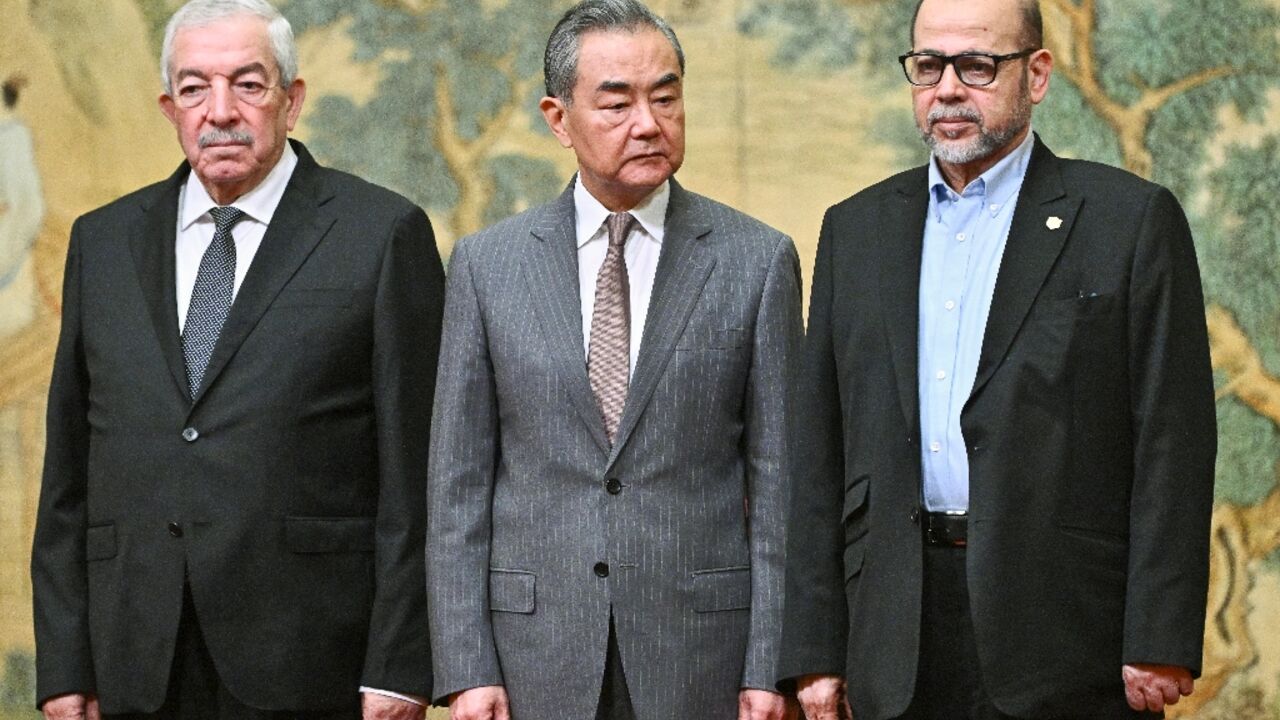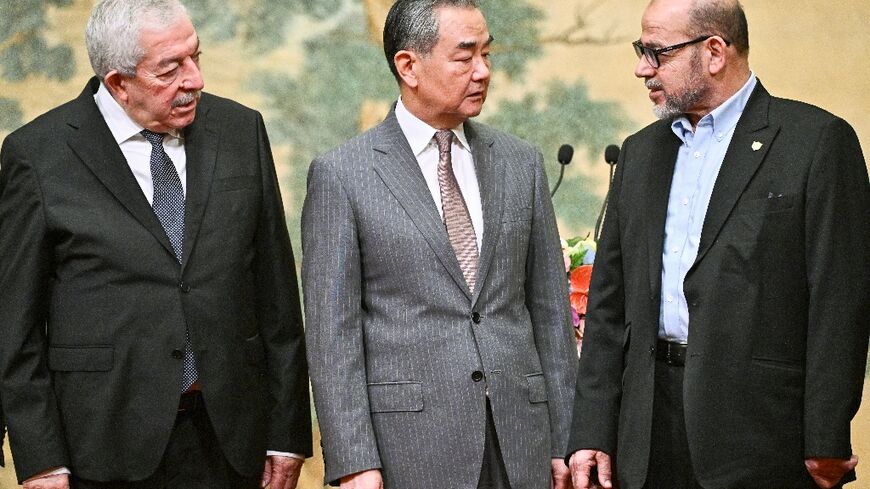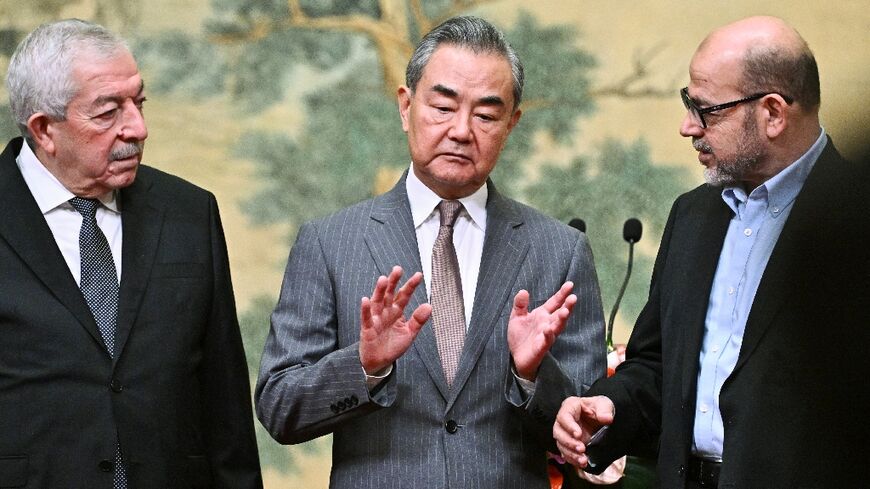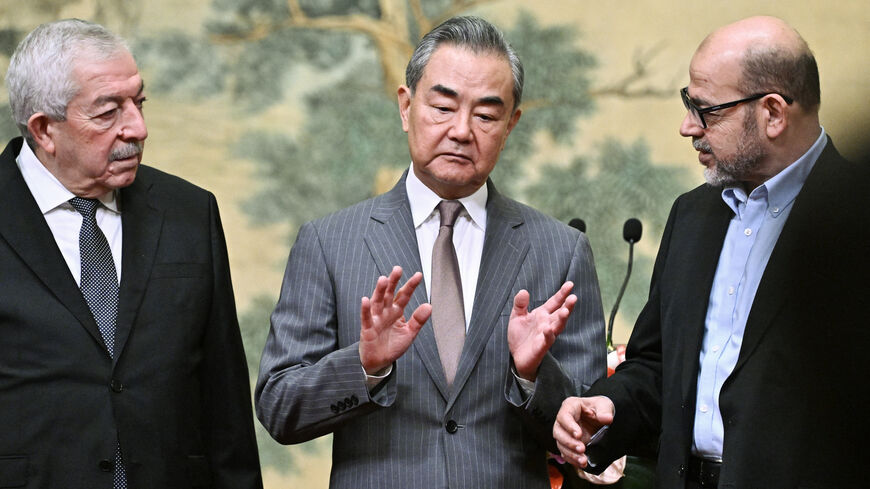Beijing deal for post-war Gaza leaves analysts sceptical

Palestinian president Mahmud Abbas's Fatah movement has agreed with Hamas to form a "national unity government" in post-war Gaza, but analysts are sceptical about the significance of the Beijing-brokered deal.
The agreement, signed by more than a dozen Palestinian factions on Tuesday, aims to find common ground for future Palestinian political institutions, which are currently divided between the Fatah-dominated Palestinian Authority in the occupied West Bank and Hamas in the Gaza Strip.
Analysts interviewed by AFP said they were still trying to assess the significance of the Chinese initiative but one said it risked being little more than a "piece of paper" given the Palestinian factions' long history of failed reconciliation bids.
- What's the Beijing deal?-
Chinese Foreign Minister Wang Yi said the agreement clears the way for an "interim national reconciliation government" for the West Bank and post-war Gaza.
"Today we sign an agreement for national unity... We are committed to national unity and we call for it," Hamas envoy Musa Abu Marzuk said after Tuesday's signing ceremony.
The idea of a post-war government of technocrats for Gaza has been floated since the first months of the conflict triggered by Hamas's unprecedented attacks on Israel on October 7 last year.
"Informal meetings between Fatah and Hamas are taking place all the time," said Joost Hiltermann, Middle East director for the International Crisis Group.
The latest negotiations in China accomplished "little to nothing", he told AFP.
Tahani Mustafa, a senior Palestinian analyst for the ICG, said the deal should be seen in the context of recent moves by some European governments to recognise the State of Palestine.
"There is now a rising global momentum around Palestinian self-determination that the Palestinians themselves are not able to capitalise on because they're so divided amongst themselves," she said.
- What are the obstacles? -
Hiltermann said determined Israeli opposition to any future role for Hamas was the most serious of an array of obstacles to the deal.
"An ideal deal would see Hamas enter the Palestine Liberation Organization in exchange for allowing the Palestinian Authority to return to Gaza and oversee humanitarian aid and reconstruction," he said.
The PLO is an alliance of largely secular Palestinian factions historically regarded by the international community as the sole legitimate representative of the Palestinian people.
"Of course, there are many obstacles in the way of such a scenario, Israel being the main one," Hiltermann told AFP.
Hamas's October 7 attack resulted in the deaths of 1,197 people, mostly civilians, according to an AFP tally based on Israeli figures, and Foreign Minister Israel Katz again pledged Tuesday that "Hamas rule will be crushed".
Gaza political analyst Mkhaimar Abusada criticised the "vagueness" of the accord's wording.
"For a Palestinian in Gaza... the agreement in Beijing is just another piece of paper," he said.
"There's the idea of reforming the PLO but there's no mention of how Hamas can be integrated into it."
Some analysts questioned the genuineness of the rival factions' desire to work together, amid Israel's retaliatory military campaign in Gaza that has killed at least 39,090 people, also mostly civilians, according to figures from the Hamas-run territory's health ministry.
"The statement issued was not for the Palestinians; it was solely to please the Chinese friends," said analyst Jehad Harb.
- What's in it for China? -
Hiltermann said China's dependence on imports of oil and gas from the region meant "it has a stake in stability in the Middle East".
It had a track record of fence-mending in the region, after brokering a surprise reconciliation deal between regional rivals Iran and Saudi Arabia in March last year.
Quentin Couvreur, a Chinese foreign policy researcher at Sciences Pos in Paris, said Beijing's main goal was to promote a political solution that cast Washington's dogged military support for Israel in an unfavourable light.
"The idea is to pose as a respectable, responsible superpower, and to denigrate the US," he said.
"It's a lot of rhetoric, it's a show of diplomacy ... but in the middle and long term, I'm more sceptical over whether it will solve the Israel-Palestine conflict."






